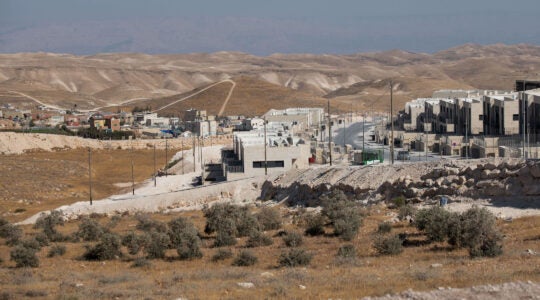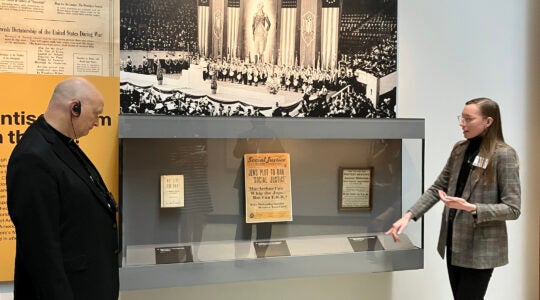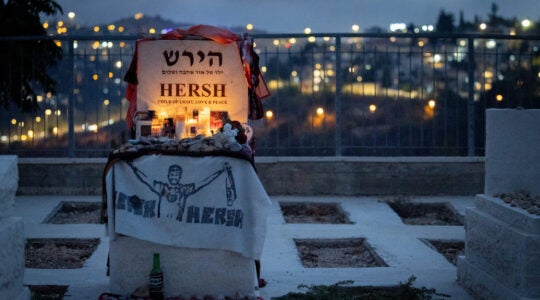JERUSALEM (JTA) – At Cafe Malcha in this city’s French Hill neighborhood, Hebrew and Arabic newspapers sit on the counter and both languages are spoken amid the din of espresso machines and customers’ laughter.
The cafe’s back room is a well-known meeting place for Jewish and Arab businessmen, some of whom live in French Hill, a quiet neighborhood of stone apartment buildings and pine trees around Hebrew University’s Mount Scopus campus.
“They live here and there are no problems whatsoever,” Moshe Feldman, a retired Israeli army colonel and long-term French Hill resident, said of the Arabs in his neighborhood.
“It does not matter to me whether they are Jews or Arabs but whether or not they live according to the law,” added Feldman, a former military governor of Ramallah.
The number of Arabs moving into French Hill, as well as other Jewish neighborhoods of Jerusalem, is rising.
Wanting to be on the Israeli side of the West Bank security fence, which in the vicinity of Jerusalem is mostly a concrete barrier some 20 feet high, thousands of Jerusalem Arabs are heading to the west side of the fence.
Those who cannot find housing in the traditionally Arab eastern part of the city, where demand has soared and prices have risen as the fence has severed Arab suburbs from Jerusalem, are moving in increasing numbers to Jewish neighborhoods of the Israeli capital, where homes are more affordable.
Ziad al-Hamouri, the head of the Jerusalem Center for Economic and Social Rights, said Palestinian newspapers now carry advertisements for homes in Jewish neighborhoods.
“It’s very expensive to move into the eastern part of the city, and at the same time there is an increase in unemployment and poverty,” he said. “This is leading Palestinians to seek out less expensive housing.”
As a consequence, outlying Jerusalem neighborhoods like French Hill, Neve Yaakov and Pisgat Zeev – which are on the Israeli side of the West Bank fence but east of the Green Line and therefore technically part of the West Bank – are becoming mixed Arab-Jewish neighborhoods.
This shift, wrought by the security fence, is profoundly changing the city’s character. In some cases it is prompting Jewish Jerusalemites unhappy with the changes to talk about leaving their neighborhoods or the city entirely.
Yisrael Kimche, an urban planner and senior researcher at the Jerusalem Institute for Israel Studies, long has warned that Arab Jerusalemites eventually would start looking for housing in Jewish neighborhoods.
“Once such a process begins, Jewish residents will start leaving these neighborhoods,” he wrote in a recent study about the implications of the security fence. “Processes of this kind are known the world over; seam neighborhoods tend to be the most severely affected. Should the phenomenon continue to spread, it may have consequences for the future of Israeli Jerusalem as the capital of the Jewish state.”
Jerusalem’s Jews seem to have mixed feelings about the changing demographics of their neighborhoods. Jews in some neigborhoods are setting up committees to prevent Arabs from moving in, and some are circulating fliers in synagogues against selling or renting homes to Arabs, according to Israeli media reports.
“It is just weird sometimes when you go, for example, to the shopping center and it seems like there are only Arabs there,” said one longtime resident of French Hill who did not want her name used. “It does not particularly bother me that there are a lot of Arabs here now, but the thing that strikes me is that I did not come from the United States 37 years ago to become a minority. When I start feeling like a minority it is unsettling.”
Most Jerusalem-area Arabs are not Israeli citizens but have permanent-resident status. They say they are moving to Jewish Jerusalem for two main reasons: long waits at checkpoints coming into the city and the possibility that their Israeli identity cards could be revoked if they live beyond the fence for an extended amount of time.
Furthermore, they say, if Jerusalem eventually is divided as part of a future peace deal and they end up on the Palestinian Authority side of the fence, they would lose access to the benefits of having an Israeli identity card – including health care, Social Security payments, freedom of movement and access to jobs.
Jalah Hussein, an electrical engineer who works in Jerusalem but lives on its outskirts in the Shuaffat refugee camp, is among those looking for a home in a Jewish area. He says he has started looking for an apartment in Pisgat Zeev.
“Everyone is moving,” he said.
The security fence “bothers all of us,” Hussein said. “If I want to travel to work, or get the kids to school or a medical clinic, it is very difficult.”
He said crossing the checkpoints into Jerusalem can take minutes or hours, depending on the level of security alert.
As for his six children adjusting to life in a Jewish area, he said, “They will have to get used to something new.”
Benita Raphaely, an agent at Jerusalem Homes Realty, which sells properties in French Hill, said more Israeli Arabs are seeking her office’s assistance. She described the potential buyers and renters as mostly professionals who have children in Israeli schools and are fully integrated residents of the city.
“We encounter apartment sellers who tell us that they only want to sell to Jews and those who don’t mind who buys their property,” Raphaely said. “There is a difference in people’s willingness to contemplate selling to Christian Arabs and Armenians rather than to Muslims. Like most things in this country, very fine distinctions are made.”
Shlomo Sirkus, a retired Bank of Israel executive, said he is considering leaving Jerusalem to be closer to his children who live elsewhere. For years he has lived in a cluster of upscale townhouses in French Hill where about a quarter of the owners are now Arabs, including some from the Galilee. Among them are doctors who work at the nearby Hadassah hospital.
“I think only Arabs will buy my house because at this point most Jews would not consider buying in a development where there is such a large number of Arabs,” Sirkus said.
Another longtime resident of French Hill who asked that her name not be used said she fears that it will become increasingly difficult to find Jewish buyers in the neighborhood.
“Their intentions are good,” the woman said of her Jewish neighbors renting or selling to Arabs. “But will there be consequences later? That is the concern.”
JTA has documented Jewish history in real-time for over a century. Keep our journalism strong by joining us in supporting independent, award-winning reporting.





